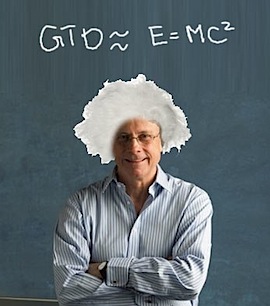
Note: This post has many references to jargons that would be familiar mainly to implementers of David Allen’s system of productivity called Getting Things Done or GTD. To Learn more about GTD, you may read this post, 5 Steps to Begin Learning GTD – A Guaranteed way to Save Hours from your Workday.
What made Einstein an Einstein or a Newton a Newton. It was their amazing capability to look at what everybody is looking at, but see at something different. The world sees an Apple falling from a tree, but Newton notices there’s something greater at work here, it’s Gravity. The world sees sunrise, sunset and umpteen other relationships with time and light throughout the day. But Einstein looks and realises that hey it’s not time that’s a contstant, but it’s the speed of light. Similarly the whole world is involved is busy getting stuff done anyway, but David Allen sees through the clutter and comes up with best-practices called GTD.
Below I’ve made a list of some amazing observations that give GTD it’s chutzpah. The brilliant thing about all these observations is that everyone one of us were coming across this at least several times every single day of our lives and any one of us could have figured it out. Be it psychologists with PHd degrees, masters in other fields but nobody noticed the below peculiarities. However David Allen did and gosh how life changing they have been.
The Next Action:
What an remarkable observation. That to move forward on any item, all you need is a Next Action. That’s it. One can only do a Next Action. We have no choice, we can only make Calls (@Calls), Complete Errands (@Errands), Speak to people (@Agenda), Do stuff on our computer (@Computer) etc. and all through our lives we’ve always been doing Next Actions only, but never figured out to think in terms of Next Actions.
Furthermore David takes his observation further. The fact that Next Actions can most be categorised in approximately 5 categories or so is an amazing piece of insight. And top it all off to notice also that there are so many Next Actions that don’t take longer 2 minutes, is pure genius. (Note: David has often given the credit of the Next Action thinking to Dean Acheson.)
There is stress as soon as we commit to do something:
You can’t see it it’s so very subtle, but it’s there. As soon as an email, voicemail or a piece of paper (even if it’s a cute little greeting card) enters my life, so does stress. And I never noticed it. Ever. It’s when I began practising GTD and began either completing or renegotating my commitments that I realised oh the burden I was under . I always had it. Hey, c’mon we all always had it. But never noticed it. But thank God David did and man life has been rosier since.
Writing down stuff, gives instant relief:
So how do you get rid of stress in life by the various commitments. Is it by doing them? Not necessariy. Why take all that trouble. Just write it down. That’s it. Imagine that. Just by writing down you begin to feel so much better. Once again through out lives we have at some point or the other have written stuff down and immediately felt that instant relief, but never questioned why that happened. David did, and realised that stress comes because of our agreements with ourselves (another brilliant observation) and the simple act of writing it down we’re actually renegotiating our agreement with our self and that’s the key to eliminating stress from our lives.
Priorities are at six different levels, three fold nature of work and the limiting criteria:
Finally since we the day we have been hungry or felt the need to poop we have been prioirtising, whether it’s sleep we want now or milk. Ofcourse our needs got more complex, but our prioritising system never changed. We kept on putting one task over another
There are probably more gems in GTD that I’ve missed. Have you noticed something in GTD that is so simple and obvious that anyone could have figured out, but hasn’t and David Allen has. Do mention it in comments below.
“You can only feel good about what you’re not doing, when you know what you’re not doing”.
This is similar to another (non-GTD) concept: “what you know, what you don’t know and what you don’t know that you don’t know”.
Thanks for the comment Shankar. I had to read that a couple of times to get that. :-)
To understand the Mr. Shankar Ram’s comment, where GTD has come into the way of life, really Mr.Shankar Ram has commented well. These comments are very similar to the problems people are facing in the real world either in the business, corporate or personal. GTD’s small instructions like ( To -Do’s, Action Plan etc) will experience the people to understand (what you really want you to know :- )
Thank you for this blogpost! I like the thought of what Newton, Einstein, and David Allen have in common: Looking at the same world as everyone else, but see something different. I made a Twitter to this page. Good thoughts need good promotion.
Thanks for a great post, I never thought of it like that before.